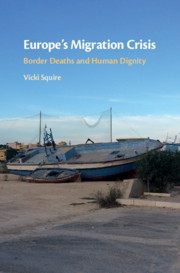Book contents
- Europe’s Migration Crisis
- Europe’s Migration Crisis
- Copyright page
- Contents
- Figures
- Acknowledgements
- Introduction
- Part I The Production of Death and Vulnerability
- Chapter 1 Crisis Politics
- Chapter 2 Biophysical Violence and Ultra-precarity
- Chapter 3 Human Dignity
- Part II The Production of Solidarity and Hope
- Conclusion
- Postscript
- Notes
- Bibliography
- Index
Chapter 3 - Human Dignity
The Pervasiveness of Death and Vulnerability
from Part I - The Production of Death and Vulnerability
Published online by Cambridge University Press: 16 September 2020
- Europe’s Migration Crisis
- Europe’s Migration Crisis
- Copyright page
- Contents
- Figures
- Acknowledgements
- Introduction
- Part I The Production of Death and Vulnerability
- Chapter 1 Crisis Politics
- Chapter 2 Biophysical Violence and Ultra-precarity
- Chapter 3 Human Dignity
- Part II The Production of Solidarity and Hope
- Conclusion
- Postscript
- Notes
- Bibliography
- Index
Summary
This chapter shifts from an analysis of the governing practices through which death and vulnerability are produced and normalised, to an exploration of the ways in which such practices are grounded in racialised processes of dehumanisation. Specifically, it considers the ways in which pervasive processes of animalisation, as well as the pervasiveness of death and vulnerability, relate to contemporary and longer-standing debates surrounding human dignity. It is in a context marked by what Chapter 2 referred to as the toleration of biophysical violence that an appeal to the dignity of people on the move has been mobilised with particular potency. This chapter considers the potential of human dignity as a critical conceptual framework for contestations over what it means to be human, while also reflecting on the ways in which the concept’s mobilisation by various governing authorities further marks the toleration of biophysical violence and perpetuates the normalisation of death and vulnerability. Situating the concept within a modern European tradition of humanism, the chapter shows how human dignity invokes a longer-standing tension between the hierarchical differentiation of worthy and unworthy people on the one hand, and the universal levelling of all people as equal on the other. By exploring the ways in which such tensions play out through racialised practices of governing migration that dehumanise people on the move, the chapter highlights the ongoing significance of a modern European tradition of humanism to conceptions of dignity mobilised during the so-called Mediterranean migration crisis. Concluding Part I of the book by drawing attention to the failure of governing practices to fully master various unruly social and physical forces, the chapter suggests that the ‘Mediterranean migration crisis’ might be understood as nothing less than a breakdown of modern European humanism itself.
- Type
- Chapter
- Information
- Europe's Migration CrisisBorder Deaths and Human Dignity, pp. 76 - 102Publisher: Cambridge University PressPrint publication year: 2020

